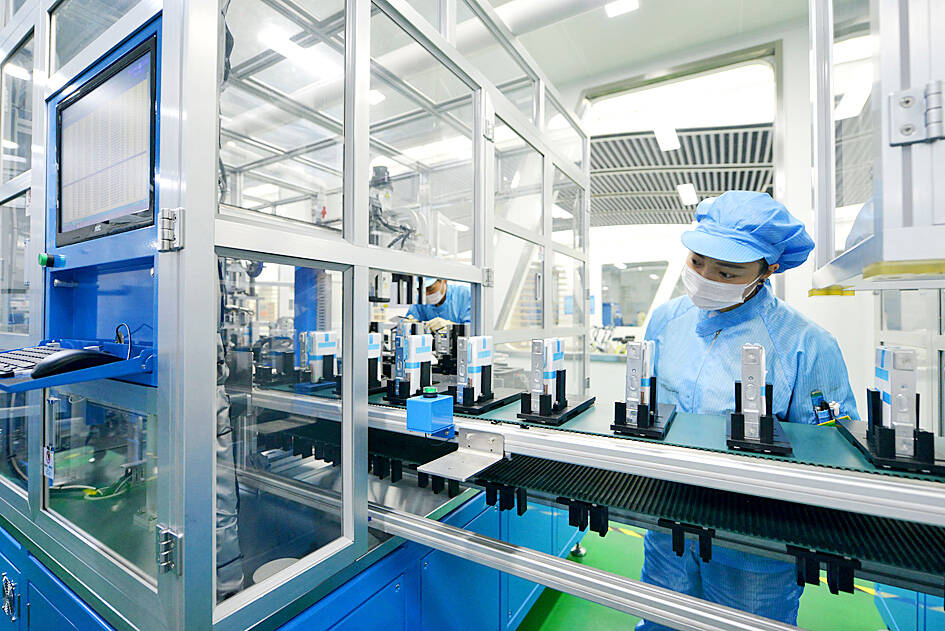The EU could become as dependent on China for lithium-ion batteries and fuel cells by 2030 as it previously was on Russia for energy before the war in Ukraine unless it takes strong measures, a paper prepared for EU leaders said.
The document, obtained by Reuters, would be the basis of discussions on Europe’s economic security during a meeting of EU leaders in Granada, Spain, on Oct. 5.
Worried by China’s growing global assertiveness and economic weight, the leaders are to discuss the European Commission’s proposals to reduce the risk of Europe being too dependent on China, and the need to diversify toward Africa and Latin America.

Photo: Reuters
The paper said that because of the intermittent nature of renewable energy sources like solar or wind, Europe would need ways to store energy to reach its goal of net zero carbon dioxide emissions by 2050.
“This will skyrocket our demand for lithium-ion batteries, fuel cells and electrolyzers, which is expected to multiply between 10 and 30 times in the coming years,” said the paper, prepared by the Spanish presidency of the EU.
While the EU has a strong position in the intermediate and assembly phases of making electrolyzers, with a more than 50 percent global market share, it relies heavily on China for fuel cells and lithium-ion batteries, which are crucial for electric vehicles.
“Without implementing strong measures, the European energy ecosystem could develop a dependency on China by 2030 of a different nature, but with a similar severity, from the one it had on Russia before the invasion of Ukraine,” it said.
According to the European Commission, in 2021, the year before the Russian invasion of Ukraine, the EU took more than 40 percent of its total gas consumption, 27 percent of oil imports and 46 percent of coal imports from Russia.
Ending most energy purchases from Russia caused an energy price shock in the EU and a surge in consumer inflation, forcing the European Central Bank to sharply raise interest rates in a move that has curbed economic growth.
Lithium-ion batteries and fuel cells were not the only areas of EU vulnerability, the Spanish presidency paper said.
“A similar scenario could unfold in the digital-tech space,” the document said. “Forecasts suggest that the demand for digital devices such as sensors, drones, data servers, storage equipment and data transmission networks will rise sharply in this decade.”
“The EU has a relatively strong position in the latter, but it shows significant weaknesses in the other areas,” it said.
By 2030, this foreign dependency could seriously hinder the productivity gains that the European industry and service sector urgently require, and could impede the modernization of agriculture systems essential to addressing climate change, it said.

MULTIFACETED: A task force has analyzed possible scenarios and created responses to assist domestic industries in dealing with US tariffs, the economics minister said The Executive Yuan is tomorrow to announce countermeasures to US President Donald Trump’s planned reciprocal tariffs, although the details of the plan would not be made public until Monday next week, Minister of Economic Affairs J.W. Kuo (郭智輝) said yesterday. The Cabinet established an economic and trade task force in November last year to deal with US trade and tariff related issues, Kuo told reporters outside the legislature in Taipei. The task force has been analyzing and evaluating all kinds of scenarios to identify suitable responses and determine how best to assist domestic industries in managing the effects of Trump’s tariffs, he

TIGHT-LIPPED: UMC said it had no merger plans at the moment, after Nikkei Asia reported that the firm and GlobalFoundries were considering restarting merger talks United Microelectronics Corp (UMC, 聯電), the world’s No. 4 contract chipmaker, yesterday launched a new US$5 billion 12-inch chip factory in Singapore as part of its latest effort to diversify its manufacturing footprint amid growing geopolitical risks. The new factory, adjacent to UMC’s existing Singapore fab in the Pasir Res Wafer Fab Park, is scheduled to enter volume production next year, utilizing mature 22-nanometer and 28-nanometer process technologies, UMC said in a statement. The company plans to invest US$5 billion during the first phase of the new fab, which would have an installed capacity of 30,000 12-inch wafers per month, it said. The

Taiwan’s official purchasing managers’ index (PMI) last month rose 0.2 percentage points to 54.2, in a second consecutive month of expansion, thanks to front-loading demand intended to avoid potential US tariff hikes, the Chung-Hua Institution for Economic Research (CIER, 中華經濟研究院) said yesterday. While short-term demand appeared robust, uncertainties rose due to US President Donald Trump’s unpredictable trade policy, CIER president Lien Hsien-ming (連賢明) told a news conference in Taipei. Taiwan’s economy this year would be characterized by high-level fluctuations and the volatility would be wilder than most expect, Lien said Demand for electronics, particularly semiconductors, continues to benefit from US technology giants’ effort

‘SWASTICAR’: Tesla CEO Elon Musk’s close association with Donald Trump has prompted opponents to brand him a ‘Nazi’ and resulted in a dramatic drop in sales Demonstrators descended on Tesla Inc dealerships across the US, and in Europe and Canada on Saturday to protest company chief Elon Musk, who has amassed extraordinary power as a top adviser to US President Donald Trump. Waving signs with messages such as “Musk is stealing our money” and “Reclaim our country,” the protests largely took place peacefully following fiery episodes of vandalism on Tesla vehicles, dealerships and other facilities in recent weeks that US officials have denounced as terrorism. Hundreds rallied on Saturday outside the Tesla dealership in Manhattan. Some blasted Musk, the world’s richest man, while others demanded the shuttering of his